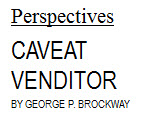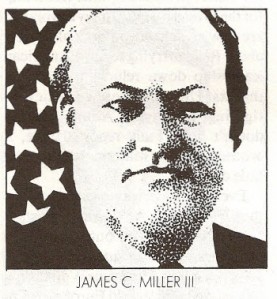Perspectives
ZEROING IN
ON THUROW
THE OTHER DAY, as I was going down in an elevator with a black activist friend of mine, we were joined by a young black messenger who pulled out a paperback and started to read. My friend, having nothing more active to do at the moment, snatched the book away. “What’s that you’re reading?” he demanded. “The dictionary.” “The dictionary! Why the dictionary?” “Well,” the young man said, “it has the words.” My friend frowned, then thrust the book back. “All right,” he said sternly, “but challenge it.”
That is more or less how I feel about Lester C. Thurow’s The Zero-Sum Society, which I just got around to reading as a result of an Op-Ed piece he had in the Times a couple of weeks ago. If you haven’t read it, I think perhaps you ought to, all right-but challenge it, starting with the title. In the book trade, the rule is that a good title is the title on a bestseller. It doesn’t have to mean anything, and The Zero-Sum Society doesn’t mean anything, even to Professor Thurow. In his first chapter he announces that “All sporting events are zero-sum games.” But the precise contrary is the case. I can’t offhand think of any sporting event that is a zero-sum game. I grant that in every sport there are winners and losers, but the sum of their scores is not zero (as it is in gambling). As for political economy, it is not like any kind of game at all (the election of Richard Nixon was a situation where everyone in the nation lost).
Thurow actually understands this very well, for in the Times article I mentioned he points out the risk we all run in allowing our cities to deteriorate. He is absolutely right that the risk is great, and that we all-repeat, all-run it. If deterioration is a game, it’s one that has no winners, and whose score is a great deal less than zero. So I advise you to challenge the title and all those passages scattered through the book where Thurow remembers the title and works it into a paragraph or two. That’s mostly window dressing.
I also advise you to challenge what he has to say about environmental problems in Chapter 5, especially as compared with his Times article. He starts off with an unsupported ad hominem comment to the effect that “environmentalism is an interest of the upper middle class.” What’s that supposed to mean? Are all interests of the upper middle class (economics, for example) suspect? Has Harlem no interest in good garbage collection? (My activist friend thinks it has.)
Next he does a bit of shadow boxing with the GNP, because it doesn’t include a clean environment among the goods worth counting. This point is even more important than he allows: Not only does the GNP have no way of registering the value of clean air; it actually counts the unhappy results of pollution – higher doctor and hospital bills – as additions to the GNP. A miner who contracts black lung disease is thus improving our national productivity.
Thurow is aware of this, at least up to a point, yet he goes ahead and asks questions that presuppose a clean environment is not a real economic objective because it is not counted in the GNP. (But don’t get me started on the GNP.) Then, on the assumption (still unsupported) that different economic classes look on the environment differently, we are presented with an allegedly intractable problem of allocating benefits and costs. Zero-sum melodrama aside, it happens that our society has made a good bit of progress with these questions – just as it supports schools (even though many taxpayers have no children), builds highways (even though many taxpayers have no cars), “and maintains parks (even though many taxpayers have hay fever).
In the meat of the chapter, Thurow tells us how we “should think about the problem of how much ‘clean environment’ to buy. Imagine,” he says (economists are great imaginers), “that someone could sell you an invisible, completely comfortable face-mask that would guarantee you clean air. How much would you be willing to pay for such a device? Whatever you would be willing to pay,” he explains, “is what economists call the shadow price of clean air.” As Mark Twain would have said, ain’t that a daisy! I have a question or two for him: How much would you pay to avoid death in the next instant from asphyxiation? Or lingering death next Earth Day from lung cancer? My questions make just as much sense as his. In other words, no sense at all.
This absurd discussion leads into the most fantastic proposal in the book (not, I understand, original with Thurow): Rather than prevent pollution, we should charge for it by a system of “effluent charges.” The confusion here is between public and private good, and the unstated assumption is that since there is no absolute line between them, they are really the same. But what would you pay for a Superman suit so you could go jogging in Central Park at midnight? Your answer is the shadow price of police protection; and instead of trying to protect you, we’ll charge muggers for a license to beat you up (if they want to kill as well as maim you, the fee will be somewhat higher).
The point is that although all costs are stated in dollars, they cannot all be compared. Police protection has a cost, but it is a condition for society. Clean and decent public services are also a condition for society – for our society – as Thurow’s Times article shows. These services cost dollars. The dollars that this magazine or Thurow’s book cost are not comparable because these goods (though surely great) are incidental, not fundamental, to our society. That environmental concerns are relatively new fundaments for society is no argument against their necessity. London didn’t have a public police force until Sir Robert Peel invented the bobbies in 1829.
All public goods are, in principle, historical, and the environmentalists are making history today. If I find so much to challenge in only one chapter of The Zero–Sum Society, why do I recommend that you read it? Aside from the stimulation the book provides (you can see that it has stimulated me), it has a few pages in another chapter that say some extraordinarily interesting things about taxation. I would never have believed it possible that anyone could convince me the corporation income tax should be abolished, yet Professor Thurow has done it. I fear his proposals on capital gains taxes are unworkable (he wants them withheld as the gains accrue; but fast growing companies – the ones with substantial gains – generally don’t have the cash to withhold), If I had my druthers, I’d trade off the abolition of the corporation income tax against the cancellation of special treatment of capital gains (which ought to be taxed as they are realized, as regular income, as they were before 1922) and the elimination or drastic modification of deductions for contributions and interest expenses. This is all moderately complicated, but I am told that Congress’ Joint Committee on Taxation has an excellent staff, and I am sure they could work it out.
SPEAKING of capital gains reminds me of a circular letter just received from Senator Daniel P. Moynihan. It is always a pleasure to hear from the Senator, because, like Professor Thurow, he writes so well. This time, however, he’s congratulating himself on his role in lowering capital gains taxes, and he’s dead wrong. As proof that he was right in advancing the lowered rates, he cites increased total collections in spite of them. The Senator connects this result with the Laffer curve. It ain’t necessarily so (more likely a lot of long-term gains were cashed for a one-time killing), but it doesn’t matter.
What does matter is that the Senator seems to be saying that (1) taxation is for revenue only, and (2) the best tax is the one that’s easiest to collect. The first question was put on the road to settlement by Andrew Jackson’s” force bill” of 1833, and was definitively settled by the Civil War. About the second issue the Greeks and Romans (not to mention the Kwakiutl Indians) had much more efficient ideas than anything proposed today. When the ancient Greeks wanted to hold a festival or build a trireme, they simply told off a rich man for the honor of paying for it. The Romans used to do the same before they became an empire, and thereafter they developed the system of selling collection rights to a tax farmer. These were a sort of license to steal (like a license to pollute) and caused no immediate trouble at all to the government selling them. The Kwakiutl evened things up by holding a potlatch: very easy and lots of fun. So the Senator’s ideas on taxation are neither so new nor so pragmatic as he thinks. The thing about special treatment for capital gains is that it is a special break for the rich, which stimulates them to gamble (not to make productive investments), and which results in more inflation for the rest of us. See THE NEW LEADER for September 7, 1981.
GEORGE P. BROCKWAY, a past NL contributor,
is the chairman of the board of directors of W. W. Norton & Co.



